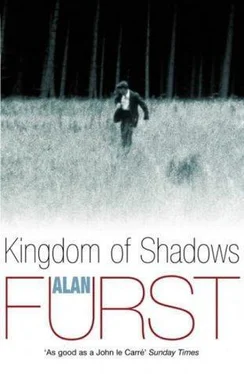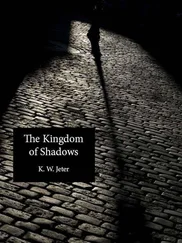Alan Furst - Kingdom of Shadows
Здесь есть возможность читать онлайн «Alan Furst - Kingdom of Shadows» весь текст электронной книги совершенно бесплатно (целиком полную версию без сокращений). В некоторых случаях можно слушать аудио, скачать через торрент в формате fb2 и присутствует краткое содержание. Жанр: Шпионский детектив, на английском языке. Описание произведения, (предисловие) а так же отзывы посетителей доступны на портале библиотеки ЛибКат.
- Название:Kingdom of Shadows
- Автор:
- Жанр:
- Год:неизвестен
- ISBN:нет данных
- Рейтинг книги:5 / 5. Голосов: 1
-
Избранное:Добавить в избранное
- Отзывы:
-
Ваша оценка:
- 100
- 1
- 2
- 3
- 4
- 5
Kingdom of Shadows: краткое содержание, описание и аннотация
Предлагаем к чтению аннотацию, описание, краткое содержание или предисловие (зависит от того, что написал сам автор книги «Kingdom of Shadows»). Если вы не нашли необходимую информацию о книге — напишите в комментариях, мы постараемся отыскать её.
Kingdom of Shadows — читать онлайн бесплатно полную книгу (весь текст) целиком
Ниже представлен текст книги, разбитый по страницам. Система сохранения места последней прочитанной страницы, позволяет с удобством читать онлайн бесплатно книгу «Kingdom of Shadows», без необходимости каждый раз заново искать на чём Вы остановились. Поставьте закладку, и сможете в любой момент перейти на страницу, на которой закончили чтение.
Интервал:
Закладка:
He put the brandy bottle away in the bottom drawer. Stood, straightened his tie, and left the office, closing the door carefully behind him. He walked along the corridor, past a vase of fresh flowers on a hall table with a mirror behind it. Greeted Bolthos, who hurried past with a courier envelope under his arm, and climbed up a flight on the marble staircase.
The floor above was busier, noisier. The commercial attache in the first office, then the economic man, then Sombor. Polanyi rapped twice and opened the door. Sombor looked up when he entered and said, “Your excellency.” He was busy writing-transferring jotted notes to a sheet of paper that would be retyped as a report.
“Colonel Sombor,” Polanyi said. “A word with you.”
“Yes, your excellency. In a moment.”
This was pure rudeness, and they both knew it. It was Sombor’s place to rise to his feet, offer a polite greeting, and attempt to satisfy the wishes of a superior. But, he as much as said, the business of state security took precedence. Now and forever. Polanyi could stand there and wait.
Which, for a time, he did.
Sombor’s gold fountain pen scratched across the paper. Like a field mouse in the granary. He made eternal notes, this man with his leather hair and sharp ears. Scratch, scratch. Now where did I put that pitchfork? But he did not have a pitchfork.
Sombor felt it. “I’m sure it must be important, your excellency. I mean to give it my full attention.”
“Please, sir,” Polanyi said, his voice barely under control. “I must tell you that certain confidential information, pertaining to my office, has been made available to the Paris prefecture. ”
“Has it. You’re certain?”
“I am. It may have been done directly, or through the services of an informant.”
“Regrettable. My office will definitely take an interest in this, your excellency. Just as soon as we can.”
Polanyi lowered his voice. “Stop it,” he said.
“Well, I must certainly try to do that. I wonder if you would be prepared to address a report to me, on this matter.”
“A report.”
“Indeed.”
Polanyi stepped close to the edge of the desk. Sombor glanced up at him, then went back to writing. Polanyi took a small silver pistol out of his belt and shot him in the middle of the head.
Sombor sprang to his feet, furious, eyes hot with indignation, unaware that a big drop of blood had left his hairline and was trickling down his forehead. “Cur!” he shouted. Leapt into the air, clapped his hands to his head, spun around in a circle, and went crashing backward over his chair. Screamed, turned blue, and died.
Polanyi took the white handkerchief from his breast pocket, wiped off the grip of the pistol, and tossed it on the floor. In the hall, running footsteps.
The police arrived almost immediately, the detectives followed a half hour later. The senior detective questioned Polanyi in his office. Over fifty, Polanyi thought, short and thick, with a small mustache and dark eyes.
He sat across the desk from Polanyi and took notes on a pad. “Monsieur Sombor was, to your knowledge, despondent?”
“Not at all. But I saw him only on official business, and then only rarely.”
“Can you describe, monsieur, exactly what happened?”
“I came to his office to discuss legation business, nothing terribly urgent, in fact I was on my way to see the commercial attache, and I decided to stop in. We spoke for a minute or two. Then, when I had turned to go, I heard a shot. I rushed to his assistance, but he was gone almost immediately.”
“Monsieur,” the detective said. Clearly he’d missed something. “The last words he spoke, would you happen to recall them?”
“He said good-bye. Before that, he’d asked for a written report on the matter we’d discussed.”
“Which was?”
“Pertained to, to an internal security matter.”
“I see. So, he spoke normally to you, you turned to leave the office, at which time the deceased extended his arm to its fullest length-I’m guessing here, pending a report from the coroner, but the nature of the wound implies, um, a certain distance. Extended his arm to its fullest length, as I said, and shot himself in the top of the head?”
He was on the verge of bursting into laughter, as was Polanyi.
“Apparently,” Polanyi said. He absolutely could not meet the detective’s eyes.
The detective cleared his throat. After a moment he said, “Why would he do that?” It wasn’t precisely a police question.
“God only knows.”
“Do you not consider it,” he searched for a word, “bizarre?”
“Bizarre,” Polanyi said. “Without a doubt.”
There were more questions, all according to form, back over the ground, and back again, but the remainder of the interview was desultory, with the truth in the air, but not articulated.
So then, take me to jail.
No, not for us to be involved in these kinds of politics. Tres Balkan, as we say.
And the hell with it.
The inspector closed his notebook, put his pen away, walked to the door, and adjusted the brim of his hat. Standing in the open doorway he said, “He was, of course, the secret police.”
“He was.”
“Bad?”
“Bad enough.”
“My condolences,” the inspector said.
Polanyi arranged for Morath to know about it right away. A telephone call from the legation. “The colonel Sombor has tragically chosen to end his life. Would you care to donate to the fund for floral arrangements?”
The end of April. Late in the evening on the rue Guisarde, the lissome Suzette winding down for the night. Plans to stage a King Neptune ball had inspired the passengers, getting a little grumpy after days of being lost at sea. Even more inspired was Jack the handsome sailor, who’d been kind enough to steady the ladder while Suzette climbed to the top to tack up decorations in the ballroom.
“No underpants?” Morath said.
“She forgot.”
A knock at the door produced Moni. Looking very sorrowful and asking if she could spend the night on the couch.
Mary Day brought out the Portuguese wine and Moni cried a little. “All my fault,” she said. “I stomped out, in the middle of an argument, and Marlene locked the door and wouldn’t let me back in.”
“Well, you’re welcome to stay,” Mary Day said.
“Just for the night. Tomorrow, all will be forgiven.” She drank some wine and lit a Gauloise. “Jealousy,” she said. “Why do I do these things?”
They sent Morath out for more wine and when he returned Moni was on the telephone. “She offered to go to a hotel,” Mary Day told him quietly. “But I asked her to stay.”
“I don’t mind. But maybe she’d prefer it.”
“Money, Nicholas,” Mary Day said. “None of us has any. Really, most people don’t.”
Moni hung up the telephone. “Well, it’s the couch for me.”
The conversation drifted here and there-poor Cara in Buenos Aires, Montrouchet’s difficulties at the Theatre des Catacombes, Juan-les-Pins-then settled on the war. “What will you do, Nicholas, if it happens?”
Morath shrugged. “I would have to go back to Hungary, I suppose. To the army.”
“What about Mary?”
“Camp follower,” Mary Day said. “He would fight, and I would cook, the stew.”
Moni smiled, but Mary Day met Morath’s eyes. “No, really,” Moni said. “Would you two run away?”
“I don’t know,” Morath said. “Paris would be bombed. Blown to pieces.”
“That’s what everybody says. We’re all going to Tangiers-that’s the plan. Otherwise, doom. Back to Montreal.”
Mary Day laughed. “Nicholas in a djellaba.”
They drank both bottles Morath had brought back and, long after midnight, Moni and Mary Day fell dead asleep lying across the bed and it was Morath who wound up on the couch. He lay there for a long time, in the smoky darkness, wondering what would happen to them. Could they run away somewhere? Where? Budapest, maybe, or New York. Lugano? No. Dead calm by a cold lake, a month and it was over. A Paris love affair, it won’t transplant. They couldn’t live anywhere else, not together they couldn’t. Stay in Paris, then. Another week, another month, whatever it turned out to be, and die in the war.
Читать дальшеИнтервал:
Закладка:
Похожие книги на «Kingdom of Shadows»
Представляем Вашему вниманию похожие книги на «Kingdom of Shadows» списком для выбора. Мы отобрали схожую по названию и смыслу литературу в надежде предоставить читателям больше вариантов отыскать новые, интересные, ещё непрочитанные произведения.
Обсуждение, отзывы о книге «Kingdom of Shadows» и просто собственные мнения читателей. Оставьте ваши комментарии, напишите, что Вы думаете о произведении, его смысле или главных героях. Укажите что конкретно понравилось, а что нет, и почему Вы так считаете.












